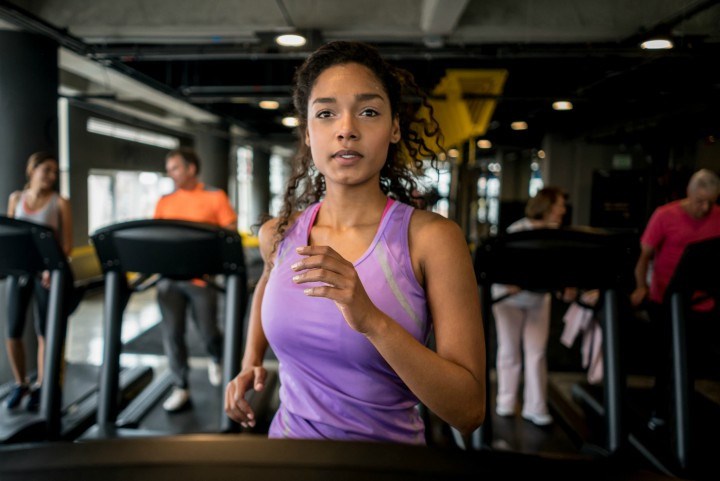While gyms are spaces many seek out for fitness and well-being, they aren’t always safe environments.
That’s true for many women and some men who experience sexual harassment at the gym, said Toronto-based relationship expert Jessica O’Reilly.
O’Reilly points to a study by ExerciseBike.ca that found nearly a fifth of American women surveyed reported being harassed while working out, along with almost one in 10 men. The survey included 1,000 participants.
The gym is often an isolated space, and if someone interacts with you in a harmful way, it can be hard to immediately escape, O’Reilly told hosts on Global’s The Morning Show.
Examples of this kind of harassment can include being touched without consent, having your personal space invaded or having your form critiqued without an invitation to do so, said O’Reilly.
“Sometimes it’s a matter of being told what to do… and they say they’re just being helpful,” she said, adding that a person who truly wants to “help” should be critiquing men as well as women.
“Friendliness is a wonderful thing. But do not veil your sexual advances in friendliness,” she said, adding that there are personal trainers who can help with workouts, rather than strangers.
The study by the biking site, which provides ratings and a platform to purchase equipment, isn’t the most extensive and should be accepted with some caution, however, the frequency of the sexual harassment of women in public is well documented, said Samantha Wells, the senior director of the Institute for Mental Health Policy Research at the Centre for Addiction and Mental Health (CAMH) in Toronto.
One in three women are subjected to unwanted sexual behaviour in public, according to 2019 data by Statistics Canada. The report found that the most common types of harassment that women reported were unwanted attention and unwanted physical contact.
“Women are more likely to be victims,” said Wells, who is also an associate professor of public health and psychiatry at the University of Toronto. “We know this is true for sexual aggression in public places.”
Even in a space like the gym, research by Wells and colleagues at CAMH shows that some men believe directing comments towards a woman about her appearance or making sexual advances towards her in public is normal.
It’s important to respect people’s boundaries in the gym and pick up on their cues, she said. If someone is wearing headphones, they might not be open to engaging in a conversation, said O’Reilly.
“If you’re going to a gym, you probably know your body better than someone else, so just stay out of people’s business,” she said. “We need to be respectful of people’s bodies, their feelings and their spaces.”
The survey by ExerciseBike.ca found that nearly three in four women have changed their gym routine due to harassment, including wearing different clothing or avoiding certain exercises. About a quarter of men reported similar experiences.
This is one of the primary reasons why many women prefer women-only gyms, said O’Reilly.
“We just overall need to be a little bit more respectful of one another, and also think about entitlement,” she said.
“When you are used to being able to say what you want, when you want without ever fearing physical harm… would you want someone bigger and stronger coming up to you?” she said, adding that it’s about respecting others’ boundaries, not axing friendly conversation.
The fact that women feel like they have to dress differently or leave a public space due to harassment means that not enough is being done to make the environment safe, explained Wells.
“That’s affecting their activities …and probably how they feel about themselves,” she said.
Many face harassment exercising in public
Even when trying to work out in outdoor public spaces, women, trans and non-binary people are more likely to face harassment, according to a previous Global News report.
A survey by Runner’s World found that 67 per cent of women felt “sometimes concerned” that they’d be physically assaulted while running.
“I gave up running altogether because I felt like I couldn’t run a few feet without someone saying something to me,” Kate, a 27-year-old runner whose last name Global agreed to withhold, previously told Global News.
Outdoor public spaces and environments like gyms need to be designed better with vulnerable groups in mind to prevent this kind of harassment, Andrea Gunraj of the Canadian Women’s Foundation told Global News.
Gyms can easily become safer by putting up signs stating that harassment will not be tolerated and implementing real consequences like the loss of a gym membership if you break the rules, said Wells. Make it a comfortable place where people feel they can report harassment, she explained.
“We’re making these environments safer for everyone — that should be our goal,” said Wells. “No one wants to feel intimidated. Nobody wants to feel objectified.”
For more information about sexual harassment in gyms, watch Jessica O’Reilly in the video above.
— With files from Global News reporter Meghan Collie.
- Global News
